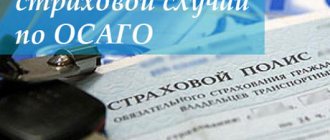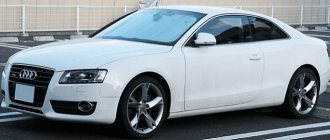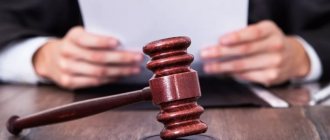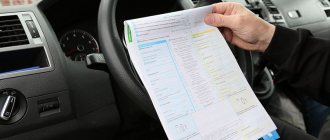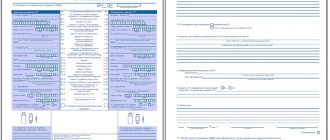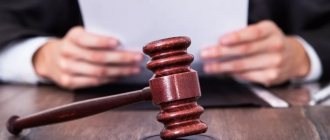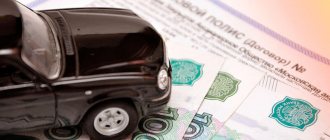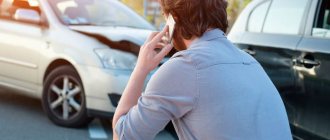Can I count on an insurance payment if the person at fault for an accident is drunk?
According to the law, a drunk driver is not allowed to drive under any circumstances, as this can lead to an accident, regardless of the reason for intoxication.
In the event of a violation, liability will be assigned to the person responsible for the accident, and the fact that he was under the influence of alcohol aggravates his guilt.
However, if the culprit of the accident was drunk, this does not relieve the insurance company from paying insurance compensation under compulsory motor liability insurance. Moreover, this circumstance does not affect either the need for compensation or the amount of compensation. At the same time, the insurance company does not have the right to shift the payment to the insurer responsible for the accident.
Attention: If the culprit of the accident was intoxicated, the victim should not doubt whether the insurance payment will be made - this circumstance will not affect the decision and the amount of compensation.
Therefore, in the case of an accident involving a drunk driver, the procedure for paying compensation is determined according to general rules regulated by state law, in accordance with paragraph 1 of Article 14.1 of Federal Law No. 40.
The same applies to time restrictions. Obviously, if the person at fault for the accident does not have an insurance policy, then, according to Article 1064 of the Civil Code, he will have to cover the damage at his own expense.
So, if the culprit of the accident was drunk and did not have a third-party insurance policy, then the answer to the question of whether the insurer will pay compensation is obvious. In this case, the one who caused the damage must eliminate it. However, to receive compensation, you will most likely have to go to court.
However, to avoid unnecessary bureaucracy and document the extent of the damage, it is recommended to contact independent appraisers in advance to assess the damage to your car. This will not only save you from unnecessary hassle, but will also allow you to confirm the extent of the damage.
But if both participants were drunk, then this circumstance complicates the situation to some extent. In this case, the insurer has grounds to refuse to pay insurance compensation, since the fault in the collision is mutual. The insurer can also legally refuse to pay insurance compensation, if such a possibility is provided for in the insurance contract, if the culprit of the accident was intoxicated.
Of course, if the person at fault was drunk, there is no doubt that the insurance company will pay. But at the same time, she has the right to make a recourse claim against him.
Such compensation may be awarded by the insurer in the following cases:
- when committing a deliberate crime or violating traffic rules;
- if there was intentional harm to health or death of the victim;
- when the person responsible for the accident is under the influence of various types of drugs;
- if the person who was driving and caused the accident did not have a license;
- If the driver does not have insurance for the car, or if it is expired or not issued;
- if the “organizer” of the accident did not document it, as required by law;
- if the criminal fled the scene of the crime;
- if the injured person does not present the vehicle for inspection within ten days;
- if the applicant for compensation has provided documents for the vehicle that have expired (diagnostic card, etc.).
Often in practice, the very fact that a person got behind the wheel in an inappropriate mental state can indicate an intention to cause harm, since this is a gross violation of the law. Therefore, in such a situation, the guilty party will have to pay recourse to the insurer.
Drinking alcohol after an accident
Sometimes the driver says that he drank after the accident, but was driving sober. However, the legislative framework provides for such a development of events and introduces a ban on the use of alcohol or drugs after the incident.
This requirement is written in clause 2.7 of the traffic rules. The driver has no right to drink until a medical examination for alcohol intoxication has been carried out or until a final decision has been made to exempt from this procedure.
This provision of law warns the driver not to relieve stress after an accident. In this case, it is almost impossible to prove that alcohol was consumed after an accident, even if it is true.
CASCO insurance only protects property - this policy does not cover civil liability. In most cases, you will not be able to receive an insurance payment if the culprit is drunk.
If the victim is intoxicated, provided the incident is properly documented, it will be possible to receive compensation.
We invite you to read: Rights and obligations of a co-borrower under a mortgage
How do insurance companies treat accidents caused by drunk drivers?
Compensation to the injured party is paid by the insurance company with which the policy of the at-fault party was issued. You can find out where the driver was insured from the documents issued to the injured party by the traffic police officer.
To receive compensation, you must submit an application and copies of the following documents to the insurance company employee:
- Documents submitted to the traffic police (report, certificate of accident);
- autopsy report;
- conclusion of a forensic medical examination and certificates from medical institutions (in case of deterioration of health);
- driver's license, vehicle registration plates, passport.
Any money that an insurance company pays in a drunk driver case can be claimed by the insurer against the at-fault party as a subrogation. This means that the insurance company first pays compensation to the injured party and then recovers the insurance premium paid in full by the injured party from the at-fault party. First, this is done through pre-trial proceedings, and then, if the driver does not agree with the insurer’s requirements, through the court. The insurance company may also seek subrogation damages if the at-fault driver refused to submit to a medical examination, even if he drank alcohol after the accident.
Liabilities
The insurance company's obligations towards the victim depend on whether he was under the influence of alcohol at the time of the accident. Thus, two cases are distinguished:
- The victim was drunk at the time of the accident.
- The victim was injured by a drunk driver who caused the accident.
Depending on this, compensation may be assigned differently. In the first case, the injured person is not entitled to any payments from the insurance company. He bears all expenses for car repairs and medical treatment. In addition, he will be forced to pay a fine to the state or serve a sentence (if criminal liability is confirmed).
In the second case, a special procedure will apply - regression under OSAGO. Its essence is that the injured person will in any case receive compensation payments from the insurance company. But subsequently, the drunk driver (the culprit of the accident) will have to reimburse the insurer for this amount. Wherein:
- The company reserves the right to pay only part of the amount to the victim, the rest is assigned to the culprit.
- The amount that a drunk driver has to pay back to the company may be more than the original amount. The guilty person is obliged to reimburse the insurer’s costs for conducting an examination, examination, etc.
All obligations of the insurance company and the culprit of the accident are reflected in detail in the table below.
Table 1. Obligations of the insurance company and the drunk driver to pay the victim
| Liabilities | |
| Insurance Company | Drunk driver (cause of accident) |
Refund:
| Refund:
|
| If a sober driver is at fault in an accident and is injured, payments are made by RSA | If a drunk driver is injured and not at fault, insurance will not be paid. |
| If a sober driver is not guilty, the damage is compensated under compulsory motor liability insurance. | If the policy is expired or invalid, the driver compensates for losses independently (without involving an insurance company) |
| If the drunk driver is at fault, no compensation will be paid. | The person at fault for the accident pays separately for insurance compensation and fines for traffic violations |
Example
Citizen E. was driving a car while intoxicated. As a result of his violation of traffic rules, he got into an accident. E. was found to be the culprit of the accident. The insurance liability of citizen E. was registered with Rosgosstrakh. The company paid the damage caused by E. to the injured party in the amount of 104,000 rubles. Based on the recourse, she filed a claim to recover compensation from E. in the amount of 104,000 rubles. The court satisfied the claims of Rosgosstrakh Insurance Company against citizen E. for the recovery of damages by way of recourse. And he ordered E. to recover 104,000 rubles from E. in favor of the insurance company in compensation for damages by way of recourse.
Driving while intoxicated
It is unacceptable for a driver who has consumed alcohol to be behind the wheel. This is due to ensuring the safety of other road users. In connection with the violation of the rules approved by Government Decree No. 1090, which entered into force on October 23, 1993, certain penalties were taken.
Legal standards
Due to the growing number of accidents involving drunk drivers, the law provides for both administrative and criminal sanctions imposed on the offender by the court. In such cases, the provisions of the law apply:
- Article 8 of the Collective Labor Agreement issued on December 30, 2001
- Article 264.1 of the Criminal Code, adopted on June 13, 1996.
These legal frameworks provide a clear indication of liability for drunk driving. Articles 115, 112, 111, 264 of the Criminal Code of the Russian Federation are indirectly applied in the event of a crime resulting in light or moderate harm to health or serious consequences or death.
Rules for registering an accident with a driver under the influence of alcohol
The circumstances, place and time of the accident are subject to establishment by traffic police officers who arrived at the request of the participants in the accident. Law enforcement officers inspect and assess the location of vehicles, the extent of damage to property and the health of people. If there are victims, they call an ambulance for hospitalization to save the lives of citizens.
It is important to know! The basis for the initiated case for the work of higher authorities is the protocol, which is drawn up at the scene of the incident. When the situation becomes clear, each party is interviewed and all information received is recorded in writing.
The protocol includes the following information:
- a plan of the area where the incident occurred;
- road conditions;
- location of relevant equipment;
- objects and traces associated with an emergency;
- signatures of all parties involved in the case and witnesses.
In the event of an accident involving drivers who are intoxicated or injured, bystanders are also involved in the process, who then participate as witnesses in explaining the causes and conditions of the accident. The fact of intoxication is established in the presence of witnesses in a medical institution by drawing blood. The inspector has the right to use a breathalyzer when stopping a vehicle.
Within 10 calendar days from the date of preparation, the report is sent to the judicial authority, where a decision is made to prosecute the offender. A citizen has the right to appear at a trial, defend his position and prove his case if he considers himself innocent. Victims whose health or property was damaged may apply to the court for compensation, indicating its amount.
Registration of the European protocol
The European protocol is drawn up without the participation of traffic police officers. But driving while drunk is against the law. Therefore, participants in an accident have the right to decide for themselves whether to hide the fact of intoxication or not.
The Europrotocol can be issued only if all conditions are met:
- There were only two people involved in the accident.
- The amount of damage does not exceed 100 thousand.
- There were no injuries or damage to health in the accident.
- The nature of the damage does not cause disagreement; both parties came to a common decision.
- Both the culprit and the victim have an MTPL policy.
Punishment for drunk driving accidents with victims
What are the penalties for an accident involving a drunk driver? If we talk about criminal liability, then the degree of bodily injury is taken as the basis for the driver.
If they are recognized by (official) doctors as benign, administrative liability will follow.
It consists in the fact that the punishment is applied in the form of a fine of up to 5 thousand rubles, or in the form of deprivation of a license for a year or a year and a half.
If there is a fatal accident involving a drunk driver, we are already talking about criminal liability.
It involves the court imposing a sentence of imprisonment for a term of 5 to 12 years (Part 4 of Article 264 of the Criminal Code of the Russian Federation).
What do traffic rules say?
It is no secret that alcohol intoxication in an accident is an aggravating circumstance, because it directly confirms that the driver twice violated the law. Firstly, being drunk guarantees that the motorist will be punished with a fine.
Secondly, causing damage to a victim in such a state will be classified as an intentional crime and, according to the law, this may result in either administrative or imprisonment.
In motor vehicle insurance, payments under compulsory motor liability insurance are made when the insurer's client causes a car accident. That is, the company protecting the liability of the initiator of the incident is obliged to pay compensation to improve the health or property of the victim in an accident.
According to the OSAGO law, the company has the right not to pay, but this will be considered illegal, even if the car owner was drunk at the time of the car accident and this is confirmed by a special examination (analysis).
This means that if you were involved in a traffic accident in 2021 and the initiator was drunk, then regardless of whether the culprit is insured by the auto insurance policy, he is obliged to repair the victim’s car at his own expense, as well as pay other compensation if there was a fact of harm to health.
Compulsory car insurance is necessary in order to:
- Cover damage caused to property (vehicle).
- Pay money for treatment if the health of a third party suffers.
In all cases, the company of the guilty party compensates the injured party, and only if the payment amounts exceed a maximum of 400 and 500 thousand rubles, then the remaining amount is charged to the guilty insured.
Step-by-step instructions for actions in case of an accident involving a drunk driver
The very fact that one of the participants in an accident suspects the other of being intoxicated does not make any changes to the general algorithm of behavior in case of an accident. It's necessary:
- stop moving;
- sound alarms and display appropriate warning signs;
- If necessary, call the traffic police and ambulance;
- In case of injury, try to provide first aid;
- if this is provided for in the insurance contract, call an employee of the insurance company to the scene of the accident;
- if necessary and possible, invite lawyers, for example, your regular lawyer;
- record the coordinates of the people involved in the accident and witnesses.
During an accident caused by a drunk driver, the law does not prohibit you from taking photos and videos. This can be done using a car DVR or any other camera. You can take photos of all the people and everything related to the event.
Traffic police officers are required to conduct an independent check on the state of intoxication of the alleged culprit of the accident.
Then you must receive a copy of the accident report and a report from the traffic police. With these documents, you can contact the insurance company to receive compensation for the damage. However, this is only possible if the other party to the collision has a third party insurance policy. If the victim’s company for some reason cannot make a payment, the victim can contact the insurance company of the person at fault in the accident in accordance with Section 9 of Article 14.1 of the Federal Liability Insurance Law.
In order to claim compensation, the extent of the damage must be determined, and this may require an expert opinion. Therefore, calling an independent accident damage expert may also be on your list of necessary actions.
Will the insurance company pay for compulsory motor liability insurance?
In the current circumstances, this question interests every participant in a road accident, and therefore it is worth understanding it in more detail.
In accordance with the norms of current legislation, insurance is paid properly, regardless of the condition of the person at fault. However, certain nuances may arise. So, after paying the insurance compensation, the insurer has the legal right to file a claim with the court to recover costs from you due to the fact that you violated the terms of the insurance contract.
Criminal liability
However, if injuries are sustained as a result of an accident committed while drunk, criminal punishment will already be for violating traffic rules with serious consequences, and the state of intoxication will only increase its severity.
The Criminal Code of the Russian Federation does not have a separate article providing for criminal punishment for the fact that a person has committed a traffic accident while intoxicated. The fact of intoxication is considered an aggravating circumstance and increases the severity of the criminal punishment against the guilty person.
OSAGO payments in case of an accident with a drunk driver
Legal regulation of road accidents involving a drunk driver is carried out simultaneously by several branches of law. Depending on the circumstances, the following rules may apply:
- Civil Code;
- Criminal Code;
- Code of Administrative Offences;
- the federal law.
As a rule, a driver under the influence of alcohol can be punished even without establishing guilt in an accident. Thus, part 1 of clause 12.8 of the Code of Administrative Offenses of the Russian Federation establishes the following punishment for driving a vehicle while intoxicated: a fine of 30,000 rubles or deprivation of a driver’s license for up to one and a half years. In case of repeated violation, the person faces criminal liability. Punishment in this case can be carried out in the form of:
- a fine of up to 300,000 rubles;
- imprisonment for up to 15 days;
- imposition of compulsory work - up to 480 hours;
- licenses for up to two years.
Punishment for causing harm to the health of others
If an accident occurs while intoxicated, then a punishment will be imposed in accordance with the established degree of severity of the harm caused to the victims.
For minor damage
If the participants in the traffic accident suffered minor damage and harm to health, then the culprit of the accident only faces deprivation of the right to drive all types of vehicles for a specific period and a fine of 2,500–5,000 rubles. But, if the accident was committed while intoxicated, then the victims may demand recovery of material damage through legal proceedings.
Average damage
At a moderate level of harm, the penalties for driving while intoxicated are more severe. This includes the imposition of a fine in the amount of 10–25 thousand rubles, and deprivation of the right to drive a vehicle for up to 2 years. Causing moderate harm is characterized by a longer rehabilitation period (over 21 days). This category also includes a moderate concussion.
Serious harm to health
If a drunk driver causes an accident and serious harm to health is caused that threatens his life, the culprit faces imprisonment for up to 4 years and confiscation of his driver’s license for 3 years. But in most cases, the court decides to replace prison arrest with forced labor.
How to get compensation?
Article 35 of Federal Law No. 4051-1 of 27/11/1992 provides that any dispute between the insurer and the policyholder must be resolved in court. The procedure for receiving payment under compulsory motor liability insurance from the culprit of an accident who is in a state of intoxication is as follows:
- The traffic police officer records the fact of the accident and identifies the culprit.
- The injured party receives compensation from the insurance company.
- The insurer then demands the amount paid from the person at fault for the accident.
What information must the culprit provide to refute the fact of drunkenness?
Obviously, the fact that the person responsible for the accident was drunk must be proven when deciding whether to take measures to pay compulsory motor insurance. A person suspected of committing such a crime, on the contrary, can prove that he is of sound mind and must undergo a medical examination in the prescribed manner.
In any case, the fact that the person responsible for the accident was intoxicated must be documented. In this case, measurement using instruments available to traffic police officers is not considered confirmation. A blood test in a medical institution is mandatory, and only the results of such a test can document the degree of intoxication of the offender.
What changes could happen in 2021?
It is planned to toughen the punishment for driving without compulsory motor liability insurance. According to the bill, a driver who has not entered into an insurance contract will face a fine of 5 thousand rubles, and in case of a repeat offense - deprivation of his driver's license for up to six months. However, the bill has not yet been adopted and is unlikely to be implemented in 2021.
However, it is likely that driving without OC will be punishable by fines using traffic cameras this year. This system has already been tested and proven to be effective. Most likely, it will be launched in some regions, and then throughout the country. The number of fines issued by cameras will be limited: a driver can receive only one fine per day.
Current legislation regarding accidents involving intoxicated participants
Russian law prohibits the use of a car without a valid auto insurance policy. This is established by federal law dated April 25, 2002. “On compulsory civil liability insurance for vehicle owners.” No. 40-FZ. This law does not provide for any restrictions on the payment of compensation in the event of intoxication of the victim of an accident. Below we will look at possible situations in more detail.
If the at-fault driver is drunk, will insurance pay the claim? Definitely yes. Some insurance companies provide in their contracts a clause stating that in the event of an accident due to the fault of the insured while intoxicated, they are not obliged to compensate for damage. This is against the law. The law does not define such a condition as a basis for refusing compensation. On the other hand, Article 14 of the Law states that the insurance company has the right to file a recourse claim against the culprit of the accident and demand a return of the money spent.
An accident involving a drunk driver is an offense for which the culprit may be subject to administrative and sometimes criminal liability. This is provided for in Article 264-1 of the Criminal Code of the Russian Federation.
The standard defines penalties for those who drive while intoxicated, refuse to take a test, or have multiple accidents while intoxicated. Such violators face:
- Everything is fine;
- compulsory (forced) labor;
- entrapment.
What sanction will be applied depends on the complexity of the situation.
Punishment for a drunk driver who causes harm to the life (health) of people is provided for in Article 264 of the Criminal Code of the Russian Federation.
Is it possible to draw up a Europrotocol if one of the participants is drunk?
The legal requirements for the possibility of drawing up the Europrotocol are as follows:
- only 2 participants in the accident, both vehicles do not have a trailer;
- the drivers came to full understanding regarding the circumstances of the incident;
- both participants have valid MTPL insurance policies;
- During the collision there was no damage to life or health - only property was damaged.
Among the requirements for concluding the Europrotocol, there is no mention of the condition of the driver who caused the collision. This means that the law does not prohibit this method of recording an incident. However, in practice, sober drivers refuse to resolve the issue peacefully, since they understand that a drunken culprit will suffer a more severe punishment. Therefore, they often demand monetary compensation from a drunk.
Accident with a drunk victim: can he count on compensation?
If it is proven that the culprit of the accident was a sober driver, and the victim was intoxicated, the insurance company does not have the right to refuse to pay him under compulsory motor liability insurance. His condition is not grounds for refusal, even if it is:
- refused to undergo examination;
- fled the scene;
- does not have a current liability policy.
However, a drunk driver will also be punished. He will be held accountable under Article 12.8 of the Code of the Russian Federation on Administrative Offenses. The punishments are quite severe. They can expect a fine of 30,000 rubles, as well as deprivation of rights for a period of one and a half to two years. The owner of a car who allowed a drunk citizen to drive will be punished in the same way. If it turns out that such a person does not have a license or has been deprived of it, he will be punished with administrative arrest (10-15 days) or a fine of 30 thousand rubles.
Persons who repeatedly commit such a crime will be prosecuted under Article 264.1 of the Criminal Code.
If the at-fault driver fled the scene of the accident
The most difficult case is the situation in which the perpetrator fled the scene of the accident. In such a situation, it is impossible to confirm intoxication and refusal of examination.
Once again the law takes the side of the victim. However, only if the vehicle involved in the accident is installed. When registering for a car, compulsory motor liability insurance will cover the harm to the victim. He does this on the basis of Article 1079 of the Civil Code, since the owner has a source of high danger and is obliged to compensate for the damage caused to him, regardless of the degree of culpability in the incident. Since liability is insured, the insurer will cover the required costs under compulsory motor liability insurance. The absence of a policy will lead to the need to compensate for the damage from your own funds.


